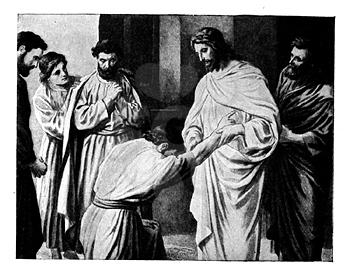
Doubtful is an ugly word in Christian circles. but it exists and can’t be ignored. So, this post examines our doubts as we continue the ‘Does God Care’ series. You see, we are allowed anger, worry, fear, envy, even lying. Everyone nods their heads and says been there, done that. We empathize with the person’s struggle. However, we aren’t allowed to doubt. No way, no how – our faith in God is constant and sure and strong. Yeah, right.
Doubtful Thomas – What a Loser!

We smugly teach our children about Thomas with a cliché to help them remember the failing of this particular disciple. Yes, ‘doubting Thomas,’ a descriptive expression used in everyday lexicon. And it’s not a compliment!
Was Thomas the only disciple who behaved in a manner unbefitting to his position as a disciple of the Messiah? I think not! We all remember Peter following at a distance when Jesus was arrested. Are you one of His followers? No way, no how Peter adamantly stated. Not once, not twice, but three times. So, why don’t we sing song ‘thrice denier Peter’? (Matthew 26:69-75)
Additionally, the Bible only records one disciple’s presence at Golgotha on the horrific crucifixion day. But do we chant ‘disloyal James,’ ‘fearful Andrew,’ or ‘hiding Matthew’?
Because hiding from God, fearing what might happen to us, or disloyalty are understandable under the circumstances. Yet, we superiorly gasp at Thomas’ doubtful attitude. We almost laugh at his silliness.
But how did Jesus respond to Thomas’ doubtful heart?

Thomas’ mantra – No belief here unless I see the nail marks and put my finger in His side. Notice, John 20:25 says Thomas told this to the disciples. Jesus wasn’t there at the time. Do you suppose the others were offended he didn’t believe them? That, in a way, he was calling them gullible or maybe even liars!
Well, a week later Jesus walks through a locked door to greet the disciples with “Peace be with you.” The walking though the door thing might be enough for me to believe. Think Thomas challenged Jesus as he did his fellow disciples a week earlier? Probably not!
Upon entering the room Jesus immediately turned his attention on Thomas. Was He annoyed? After all, Thomas spent three years under Jesus’s teachings and He told them to prepare for His death and resurrection. But no, Jesus didn’t chastise Thomas for his unbelief, but met him where he was in his faith. Jesus told him to look and prod so that he stopped doubting.
We can learn and take comfort from ‘Doubting Thomas’

Yes, really!
1. Think Thomas pulled a fast one? Think again. Jesus knew about Thomas’ doubts and he knows our doubts too. So, talk to Jesus truthfully. He helps us in our times of need – yes, even doubtful times.
2. Don’t have a perfect faith? That’s ok. Like Thomas, Jesus meets us where we are in our walk.
3. Did you know Thomas was willing to die because of his faith in Jesus? (John 11:16) Additionally, after his encounter with the risen Jesus, the Bible records that he stayed with the other disciples post Jesus’ ascension. Acts 1: 12-14, tells us that Thomas was present when they chose Judas Iscariot’s replacement and was often united in prayer with other believers. He was also present when tongues of fire appeared, and he was filled with the Holy Spirit. (Acts 2: 1-4) So, times of doubt don’t mean we are faithless. In fact, doubt indicates there is faith, it just needs strengthened.
4. Ah, then there is verse 29 when Jesus tells Thomas:
“Because you have seen me, you have believed; blessed are those who have not seen and yet have believed” (John 20: 29 NIV).
Take heart, believing without seeing brings blessings! This is another beatitude, ladies. It promises us blessings for belief without seeing. What is a beatitude? They describe God’s many blessings to believers in various circumstances. For the other beatitudes see Matthew 5: 1-12.
Ok, you say, that is great for those with solid faith, ‘but what if I doubt because I don’t see?’ How do I take comfort in this verse? Check out number 5 below.
5.“You must understand that seeing is believing, but also know that believing is seeing.” (Denis Waitley quote.)
Thomas’ faith allowed him to believe what he saw. He was in doubt at this time in his life, but even in his weakened faith it allowed him to believe when he saw Jesus. Keep in mind, many witnessed Jesus’ miracles and didn’t believe. Why? Because two of us can see the same thing, but interpret it differently. Ask any jury who listens to different eyewitness accounts.
Doubt doesn’t mean we don’t believe at all. In fact, as mentioned above, it tells us there is some faith or we wouldn’t doubt. Instead, we would just outright dismiss Jesus. However, someday we will see Jesus and, like Thomas, even our doubtful faith will let us see clearly. And we will cry out like Thomas: “My Lord and my God!”
Then there is the man who said: I Believe, Help my Unbelief! (Mark 9:24)

Yes, a dichotomy for sure. However, the above words were spoken desperately by a father with a seizure burdened son. I so get this father. It’s a prayer confessing Jesus as Lord and seeking God’s gift of faith. Why? Because Jesus told the father “everything is possible for him who believes.” Despite the father’s weak faith, Jesus healed the boy.
So, Does God Care When I’m Doubtful?
Well, he cared about Thomas and showed up where Thomas was to help him work through his unbelief. He cared enough to heal the man’s son despite his weak faith. And he cares about your doubtful times too. Undoubtedly, there is some faith if your doubtful attitude or thoughts bother you. So, when you are doubtful cry out to God as this father did: “I believe, help my unbelief.”
After all, Jesus said that all we need is

Hence, how do we deal with James admonition about doubt?

James does seem to contradict how Jesus dealt with doubtful individuals he encountered, but let’s look at the scene where the man requests healing for his son.
Jesus and three of the disciples just returned from the Transfiguration to find the other disciples arguing with the teachers of the law. Ever feel this way? Gone for a short time only to return home to confusion and chaos, or as James puts it: “like a wave of the sea driven and tossed by the wind!”
I can hear Jesus sigh as He asks what is going on. Unable to heal the boy with seizures these men resorted to arguing. What was Jesus’ response? “O unbelieving generation.” Yes, He chastised the disciples for doubting. God’s power comes from faith!
However, let’s dig a little deeper. Now I am no theologian, but I think this verse also describes the man asking for his son’s healing. Confused and in anguished turmoil, he cries out to God with an amusing, but desperate plea for faith. Does Jesus chastise the man for asking? No, Jesus strengthens his belief and in the end the man did not doubt and voila healing.
So, when we seek God’s help and blessings, first cry out to God to take away our doubts. Perhaps good advice for the disciples too.
Helpful Resources for our doubtful times
Need more comfort when is comes to doubts? Check out Jesus’ meeting with Mary Magdalene. (John 20: 10-18)
It’s one of my favorite moments in the Bible. Mary returns to the tomb to find it empty! She is confused, scared, and sad. She asks, ‘What did they do with Jesus?’ Resurrection doesn’t enter her mind.
Unbeknownst to her, Jesus is watching her reaction. Do you think He shook his head at how obtuse she was on day three? He had told His followers He would rise. Nevertheless, Jesus is patient with sorrowful and doubtful Mary, but also messes with her a bit. Instead of identifying Himself, Jesus asks her, “Dear woman why are you crying? Who are you looking for?”
Mary still doesn’t get it. She thinks Jesus is the gardener! I can almost see Jesus shaking his head and smiling. And then He says her name, “MARY,” and she knows immediately. Like Thomas, Jesus met Mary where her faith was at the moment. All we have to do is ask: “I believe, help my unbelief!”
Also, check out these Bible verses about doubt and/or this one week devotion that teaches confidence in God.
Comments
As always, I invite you to comment below. Do you agree or disagree on my thoughts about doubt? Any general thoughts on this blog post or the quotes used in the article? Want to expound on other biblical doubters?
You can also help others in our WSC community by sharing your ‘doubting’ Thomas moments and how, or if, you overcame them.

